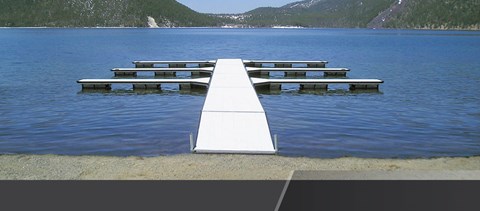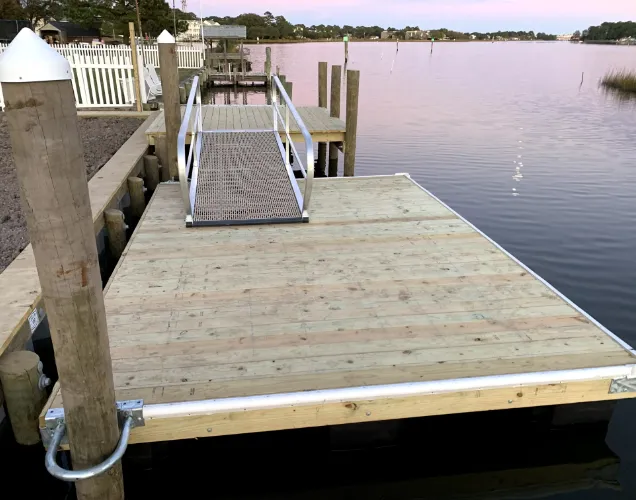Browsing the Options: Picking the Right Dock Company for Your Floating Dock Task
Browsing the Options: Picking the Right Dock Company for Your Floating Dock Task
Blog Article
Floating Docks: The Suitable Selection for Versatile Water Access
Floating docks present a compelling remedy for a range of water gain access to needs, supplying convenience that transcends traditional mooring alternatives. The modular nature of floating docks facilitates modification, catering to specific needs.
Advantages of Floating Docks
Floating docks deal many advantages that enhance water accessibility for different applications. Their capability to fall and rise with altering water levels makes them particularly advantageous in settings with changing tides or seasonal variants. This versatility makes sure that vessels can easily tie without problem for the water's depth, offering a trustworthy platform for entertainment, business, and commercial uses.
Additionally, floating docks are commonly built from durable materials that stand up to rust, making them ideal for long-term use in aquatic environments. Their setup is typically less intrusive than conventional set docks, lowering the environmental effect and facilitating quicker implementation (floating dock builder). This versatility enables for less complicated relocation or reconfiguration according to individual requirements or ecological adjustments
Safety is one more crucial advantage; floating docks can provide secure gain access to for people boarding or getting off from watercrafts and minimize the danger of mishaps related to unstable surfaces. They can be developed to accommodate a selection of devices, such as cleats and fenders, enhancing functionality. Overall, floating docks represent a reliable option for enhancing water gain access to across diverse sectors while advertising safety and security and environmental sustainability.

Kinds Of Floating Docks
Various kinds of floating docks satisfy various needs and atmospheres, each made with certain attributes to optimize performance. One of the most common types consist of modular docks, which include interlacing areas that allow for simple customization and growth. These docks are perfect for entertainment usage, as they can be tailored to fit different watercraft sizes and water conditions.
One more preferred option is the fixed floating dock, which remains anchored in position yet floats with changing water levels. floating dock builder. This kind is particularly fit for locations with minimal tidal changes, providing steady gain access to for angling or swimming. In addition, there are drive-on docks, which feature a sloped layout that allows boats to conveniently drive on and off, making them appropriate for personal watercraft and smaller sized vessels
For commercial applications, durable floating docks are available, built from enhanced products to stand up to significant tons and rough aquatic environments. Eco-friendly floating docks use sustainable materials and layouts to decrease ecological effect, typically integrating features like vegetation to sustain regional wildlife. Understanding the numerous kinds of floating docks makes certain that customers can choose the most ideal option for their particular demands.
Installation Process Review
An effective setup of floating docks requires cautious planning and interest to information to make sure optimal efficiency and security. The first step involves analyzing the site problems, including water deepness, current, and possible obstacles. This analysis informs the option of the suitable dock products and design customized to the specific atmosphere.
Next, acquiring necessary licenses is crucial, as several jurisdictions have laws relating to construction on water bodies. When approvals are protected, the installment can proceed. Begin by preparing the structure, which might involve anchoring systems or pilings tailored to the dock kind and neighborhood conditions.
Complying with the structure setup, put together the dock areas according to supplier specifications. Make sure that all parts are firmly fastened and lined up to stand up to ecological tensions. Setting the dock in the assigned location, guaranteeing it is degree and stable.

Upkeep Tips and Finest Practices
After the installation process is complete, ongoing maintenance plays a vital duty in making certain the long life and performance of floating docks. Normal assessments ought to be conducted to identify any kind of indications of wear, damage, or damages - dock company. Inspect for any loosened fittings, splits, or separation in the dock areas, as these can jeopardize structural honesty
Cleaning the dock is vital to get rid of debris, algae, and Continue various other build-up that can influence its appearance and safety and security. Use a mild pressure clean regularly to keep tidiness without creating damages to the surface area. In addition, applying a safety sealant every couple of years can aid improve longevity and withstand ecological wear.
Pay attention to the mooring lines and supports, ensuring they are safe and secure and totally free from deterioration. Replace any type of abject elements without delay to prevent threats. Seasonal adjustments might additionally be necessary; during severe climate condition, reinforcing the dock or repositioning can protect against damage.
Applications for Floating Docks
Floating docks offer a wide range of applications, providing click to both entertainment and commercial requirements. In entertainment settings, they offer smooth accessibility to rivers for tasks such as boating, fishing, and swimming. Their adjustable nature enables for setup in differing water degrees, ensuring secure and secure gain access to no matter tidal fluctuations.
Commercially, floating docks are crucial for marinas and waterfront services. They facilitate the docking of vessels, enabling efficient packing and discharging of products. Their modular style enables easy development or reconfiguration to suit altering organization demands, making them ideal for boat rentals, excursion procedures, or fishing charters.
Furthermore, floating docks are made use of in ecological applications such as water research study and habitat remediation. They can work as platforms for clinical research studies, checking water high quality, or carrying out wildlife studies without troubling sensitive communities.
In industrial contexts, floating docks are employed in building and construction jobs, offering access to hard-to-reach locations for devices and personnel. Their versatility, resilience, and marginal influence on the atmosphere make them an optimal selection for a vast variety of applications, improving both functionality and accessibility in numerous water-based settings.
Final Thought
In final thought, floating docks stand for an optimal service for varied water accessibility needs, owing to their adaptability, toughness, and modular layout. Floating docks offer as a valuable asset for leisure, business, and environmental projects, guaranteeing reputable accessibility to rivers look at this site and advertising lasting techniques in aquatic environments.
Floating docks present an engaging service for a range of water accessibility needs, providing convenience that goes beyond typical mooring alternatives.Floating docks deal many benefits that improve water gain access to for different applications. Generally, floating docks stand for a reliable remedy for boosting water gain access to across diverse sectors while promoting safety and security and ecological sustainability.
One more prominent choice is the stationary floating dock, which continues to be secured in place but floats with transforming water degrees.In final thought, floating docks represent an optimal service for diverse water accessibility requires, owing to their versatility, toughness, and modular style.
Report this page